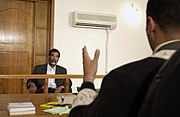
Back محاكمة صدام حسين Arabic دادگاییکردنی سەددام حوسێن CKB Saddam Hussein#Der Prozess German محاکمه صدام حسین Persian Persidangan Saddam Hussein ID Strafproces tegen Saddam Hoessein Dutch Julgamento de Saddam Hussein Portuguese Суд над Саддамом Хусейном Russian การพิจารณาซัดดัม ฮุสเซน Thai Paglilitis kay Saddam Hussein Tagalog
| Trial of Saddam Hussein | |
|---|---|
 Saddam Hussein sitting before an Iraqi judge at a courthouse in Baghdad (1 July 2004) | |
| Court | Iraqi Special Tribunal (IST) |
| Decided | 19 October 2005 – 21 December 2006 |
| Verdict | Saddam Hussein found guilty of crimes against humanity and subsequently sentenced to death; executed on 30 December 2006 |
The trial of Saddam Hussein was the trial of the deposed President of Iraq Saddam Hussein by the Iraqi Interim Government for crimes against humanity during his time in office.
The Coalition Provisional Authority voted to create the Iraqi Special Tribunal (IST), consisting of five Iraqi judges, on 9 December 2003, to try Saddam and his aides for charges of war crimes, crimes against humanity, and genocide[1] dating back to the early 1980s.
Saddam was captured by U.S. forces on 13 December 2003.[2] He remained in custody by U.S. forces at Camp Cropper in Baghdad, along with eleven senior Ba'athist officials. Particular attention was paid during the trial to activities in violent campaigns against the Kurds in the north during the Iran–Iraq War, against the Shiites in the south in 1991 and 1999 to put down revolts, and in Dujail after a failed assassination attempt against Saddam on 8 July 1982, during the Iran–Iraq War. Saddam asserted in his defense that he had been unlawfully overthrown, and was still the president of Iraq.
The first trial began before the Iraqi Special Tribunal on 19 October 2005. At this trial Saddam and seven other defendants were tried for crimes against humanity with regard to events that took place after a failed assassination attempt in Dujail in 1982 by members of the Islamic Dawa Party (see also human rights abuses in Iraq under Saddam Hussein). A second and separate trial began on 21 August 2006,[3] trying Saddam and six co-defendants for genocide during the Anfal military campaign against the Kurds in northern Iraq.
On 5 November 2006, Saddam was sentenced to death by hanging. On 26 December, Saddam's appeal was rejected and the death sentence upheld. No further appeals were taken and Saddam was ordered executed within 30 days of that date. The date and place of the execution were secret until the sentence was carried out.[4] Saddam was executed by hanging on 30 December 2006.[5] With his death, all other charges were dropped.
Critics viewed the trial as a show trial that did not meet international standards on the right to a fair trial. Amnesty International stated that the trial was "unfair,"[6] and Human Rights Watch judged that Saddam's execution "follows a flawed trial and marks a significant step away from the rule of law in Iraq."[7] Several months before the trial took place, Salem Chalabi, the former head of the Iraq Special Tribunal (which was established to try Hussein), accused interim Iraqi Prime Minister Iyad Allawi of pushing for a hasty show trial and execution, stating: "Show trials followed by speedy executions may help the interim government politically in the short term but will be counterproductive for the development of democracy and the rule of law in Iraq in the long term."[8]
- ^ Sachs, Susan (10 December 2003). "Iraqi Governing Council Sets Up Its Own Court for War Crimes". The New York Times. Retrieved 22 May 2024.
- ^ Lewis, Neil A. (15 December 2003). "THE CAPTURE OF HUSSEIN: LEGAL PROCESS; Iraqis Just Recently Set Rules to Govern Tribunal". The New York Times. Retrieved 22 May 2024.
- ^ Paley, Amit R. (22 August 2006). "As Genocide Trial Begins, Hussein Is Again Defiant". The Washington Post. Retrieved 26 May 2010.
- ^ "Death sentence for Saddam upheld". BBC World Service. 26 December 2006. Retrieved 24 November 2011.
- ^ "|| World". Archived from the original on 30 September 2007. Retrieved 20 January 2007.
- ^ "Iraq: Amnesty International condemns Iraqi Appeal Court verdict against Saddam Hussein and co-accused". www.amnesty.org.
- ^ Iraq: Saddam Hussein Put to Death, Human Rights Watch (30-12-2006).
- ^ "Iraq PM 'seeks Saddam show trial'". BBC News. 23 September 2004. Retrieved 26 May 2010.
© MMXXIII Rich X Search. We shall prevail. All rights reserved. Rich X Search